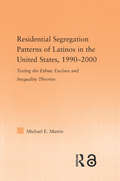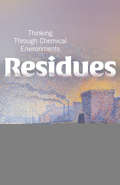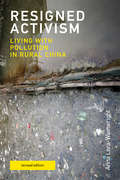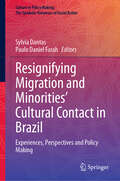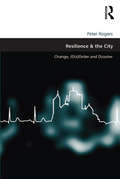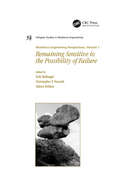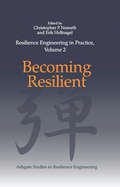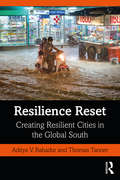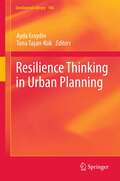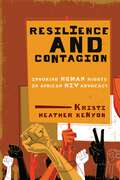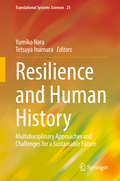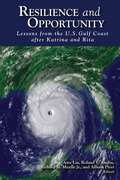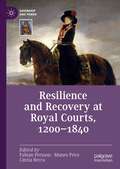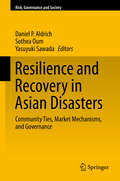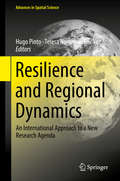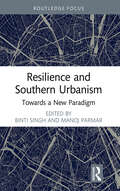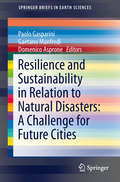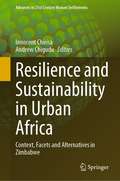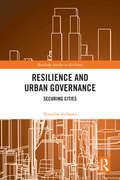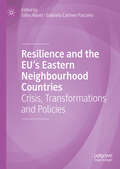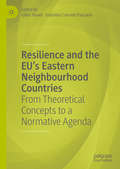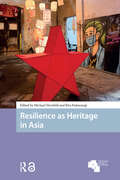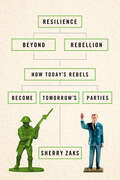- Table View
- List View
Residential Segregation Patterns of Latinos in the United States, 1990-2000: Testing The Ethnic Enclave And Inequality Theories (Latino Communities: Emerging Voices - Political, Social, Cultural and Legal Issues)
by Michael E MartinHistorically, residential segregation of Latinos has generally been seen as a result of immigration and the process of self-segregation into ethnic enclaves. The only theoretical exception to ethnic enclave Latino segregation has been the structural inequality related to Latinos that have a high degree of African ancestry. This study of the 331 metropolitan area in the United States between 1990 and 2000 shows that Latinos are facing structural inequalities outside of the degree of African ancestry. The results of the author's research suggest that Latino segregation is due to the mobility of Latinos and structural barriers in wealth creation due to limited housing equity and limited occupational mobility. In addition, Latino suburbanization appears to be a segregation force rather than an integration force. This study also shows that Mexicans, Puerto Ricans and Cubans have different experiences with residential segregation. Residential segregation of Cubans does not appear to be a problem in the U.S. Puerto Ricans continue to be the most segregated Latino sub-group and inequality is a large factor in Puerto Rican segregation. A more in-depth analysis reveals that the Puerto Rican experience is bifurcated between the older highly segregated enclaves where inequality is a large problem and new enclaves where inequality and segregation are not an issue. The Mexican residential segregation experience reflects that immigration and mobility are important factors but previous theorists have underestimated the barriers Mexicans face in obtaining generational wealth and moving from the ethnic enclave into the American mainstream.
Residues: Thinking Through Chemical Environments (Nature, Society, and Culture)
by Nathalie Jas Soraya Boudia Scott Frickel Carsten Reinhardt Angela N. Creager Emmanuel Henry Jody A. RobertsResidues offers readers a new approach for conceptualizing the environmental impacts of chemicals production, consumption, disposal, and regulation. Environmental protection regimes tend to be highly segmented according to place, media, substance, and effect; academic scholarship often reflects this same segmented approach. Yet, in chemical substances we encounter phenomena that are at once voluminous and miniscule, singular and ubiquitous, regulated yet unruly. Inspired by recent studies of materiality and infrastructures, we introduce “residual materialism” as a framework for attending to the socio-material properties of chemicals and their world-making powers. Tracking residues through time, space, and understanding helps us see how the past has been built into our present chemical environments and future-oriented regulatory systems, why contaminants seem to always evade control, and why the Anthropocene is as inextricably harnessed to the synthesis of carbon into new molecules as it is driven by carbon’s combustion.
Resigned Activism, revised edition: Living with Pollution in Rural China (Urban and Industrial Environments)
by Anna Lora-WainwrightAn examination of the daily grind of living with pollution in rural China and of the varying forms of activism that develop in response.Residents of rapidly industrializing rural areas in China live with pollution every day. Villagers drink obviously tainted water and breathe visibly dirty air, afflicted by a variety of ailments—from arthritis to nosebleeds—that they ascribe to the effects of industrial pollution. In Resigned Activism, Anna Lora-Wainwright explores the daily grind of living with pollution in rural China and the varying forms of activism that develop in response. This revised edition offers expanded acknowledgment of the contributions of Lora-Wainwright&’s collaborators in China.Lora-Wainwright finds that claims of health or environmental damage are politically sensitive, and that efforts to seek redress are frustrated by limited access to scientific evidence, growing socioeconomic inequalities, and complex local realities. Villagers, feeling powerless, often come to accept pollution as part of the environment; their activism is tempered by their resignation. Drawing on fieldwork done with teams of collaborators, Lora-Wainwright offers three case studies of &“resigned activism&” in rural China, examining the experiences of villagers who live with the effects of phosphorous mining and fertilizer production, lead and zinc mining, and electronic waste processing. The book also includes extended summaries of the in-depth research carried out by Ajiang Chen and his team in some of China&’s &“cancer villages,&” village-sized clusters of high cancer incidence. These cases make clear the staggering human costs of development and the deeply uneven distribution of costs and benefits that underlie China&’s economic power.
Resignifying Migration and Minorities' Cultural Contact in Brazil: Experiences, Perspectives and Policy Making (Culture in Policy Making: The Symbolic Universes of Social Action)
by Sylvia Dantas Paulo Daniel FarahThis volume provides in-depth discussions on the challenges of intercultural encounters in Brazil. It analyzes existing policies related to migration and minorities and proposes innovative approaches to policy-making. It also highlights policies that have had a real social impact. The volume consolidates theoretical contributions from authors of different but convergent fields to indicate the role of culture and cultural processes in a wide range of phenomena such as psychosocial intervention with immigrants, emigrants, returnees and refugees, homelessness, mental health and interculturality, mobility in urban settings, monolingualism and monocultural curriculum at Brazilian schools and universities, besides narratives of new and older immigrants. Displacement is one of the 21st century's greatest challenges, and this volume provides interdisciplinary perspectives on mobility and people in cultural contact in Brazil, the largest country in South America and the fifth most populous in the world. Although seen from a Brazilian scenario, issues discussed here permeate all other countries that are diverse and receive immigrants, and shed light on the complex socio-cultural world in which we live.
Resilience & the City: Change, (Dis)Order and Disaster (New Security Challenges Ser.)
by Peter RogersFollowing the turbulent events of the first few years of the 21st century, the growth of new security and disaster measures have led to significant changes to urban design and the management of urban space. This book blends the genealogical method of Foucault with the theory of rhythms by Lefebvre to examine these changes. The spatial history of urban disaster is linked to the rhythms of everyday urban experience to offer a revised understanding of the regulation of order and disorder in the city. In doing so, the book highlights issues of ’hardening’ space, the drift from civil defence to civil protection to civil contingencies and resilience; this assessment realigns the potential impact of tightening security practices and resilient ways of thinking, doing and acting on societal security. This also links to growing concerns about quality of life over the use and potential abuse of security and disaster legislation for managing social unrest. Examples studied include the increased exclusion of minorities (such as young people) from democracy and public life; security oriented interventions in the ethnic minority communities, the use of automated technologies in policing civil and minor offences (e.g. digital plate recognition and speeding) and the interplay of diverse social groups in more commercially aligned and increasingly ’securitised’ public spaces of the ’entrepreneurial’ city. This book highlights many significant problems with the direction of British democracy and suggests there may be both positive and negative results from becoming more resilient. While providing a critical appraisal of the realignment of neoliberal democracy at large, it also links discussion on ’gentrification’, ’revanchism’ and ’urban security’ to a forward looking agenda for further research.
Resilience Engineering Perspectives, Volume 1: Remaining Sensitive to the Possibility of Failure (Ashgate Studies in Resilience Engineering)
by Christopher P. NemethIn the resilience engineering approach to safety, failures and successes are seen as two different outcomes of the same underlying process, namely how people and organizations cope with complex, underspecified and therefore partly unpredictable work environments. Therefore safety can no longer be ensured by constraining performance and eliminating risks. Instead, it is necessary to actively manage how people and organizations adjust what they do to meet the current conditions of the workplace, by trading off efficiency and thoroughness and by making sacrificing decisions. The Ashgate Studies in Resilience Engineering series promulgates new methods, principles and experiences that can complement established safety management approaches, providing invaluable insights and guidance for practitioners and researchers alike in all safety-critical domains. While the Studies pertain to all complex systems they are of particular interest to high hazard sectors such as aviation, ground transportation, the military, energy production and distribution, and healthcare. Published periodically within this series will be edited volumes titled Resilience Engineering Perspectives. The first volume, Remaining Sensitive to the Possibility of Failure, presents a collection of 20 chapters from international experts. This collection deals with important issues such as measurements and models, the use of procedures to ensure safety, the relation between resilience and robustness, safety management, and the use of risk analysis. The final six chapters utilise the report from a serious medical accident to illustrate more concretely how resilience engineering can make a difference, both to the understanding of how accidents happen and to what an organisation can do to become more resilient.
Resilience Engineering in Practice, Volume 2: Becoming Resilient (Ashgate Studies in Resilience Engineering)
by Erik Hollnagel Christopher P. NemethThis is the fifth book published within the Ashgate Studies in Resilience Engineering series. The first volume introduced resilience engineering broadly. The second and third volumes established the research foundation for the real-world applications that then were described in the fourth volume: Resilience Engineering in Practice. The current volume continues this development by focusing on the role of resilience in the development of solutions. Since its inception, the development of resilience engineering as a concept and a field of practice has insisted on expanding the scope from a preoccupation with failure to include also the acceptable everyday functioning of a system or an organisation. The preoccupation with failures and adverse outcomes focuses on situations where something goes wrong and the tries to keep the number of such events and their (adverse) outcomes as low as possible. The aim of resilience engineering and of this volume is to describe how safety can change from being protective to become productive and increase the number of things that go right by improving the resilience of the system.
Resilience Reset: Creating Resilient Cities in the Global South
by Thomas Tanner Aditya V. BahadurDrawing on evidence from urban resilience initiatives around the globe, the authors make a compelling argument for a "resilience reset", a pause and stocktake that critically examines the concepts, practices and challenges of building resilience, particularly in cities of the Global South. In turn, the book calls for the world’s cities to alter their course and "pivot" towards novel approaches to enhancing resilience. The book presents shifts in ways of acquiring and analysing data, building community resilience, approaching urban planning, engaging with informality, delivering financing, and building the skills of those running cities in a post-COVID world grappling with climate impacts. In Resilience Reset, the authors encourage researchers, policymakers, and practitioners to break out of existing modes of thinking and doing that may no longer be relevant for our rapidly urbanising and dynamic world. The book draws on the latest academic and practice-based evidence to provide actionable insights for cities that will enable them to deal with multiple interacting shocks and stresses. The book will be an indispensable resource to those studying urbanisation, development, climate change and risk management as well as for those designing and deploying operational initiatives to enhance urban resilience in businesses, international organisations, civil society organisations and governments. It is a must-read for anyone interested in managing the risks of climate impacts in urban centres in the Global South.
Resilience Thinking in Urban Planning
by Tuna Taşan-Kok Ayda EraydinThere is consensus in literature that urban areas have become increasingly vulnerable to the outcomes of economic restructuring under the neoliberal political economic ideology. The increased frequency and widening diversity of problems offer evidence that the socio-economic and spatial policies, planning and practices introduced under the neoliberal agenda can no longer be sustained. As this shortfall was becoming more evident among urban policymakers, planners, and researchers in different parts of the world, a group of discontent researchers began searching for new approaches to addressing the increasing vulnerabilities of urban systems in the wake of growing socio-economic and ecological problems. This book is the joint effort of those who have long felt that contemporary planning systems and policies are inadequate in preparing cities for the future in an increasingly neoliberalising world. It argues that "resilience thinking" can form the basis of an alternative approach to planning. Drawing upon case studies from five cities in Europe, namely Lisbon, Porto, Istanbul, Stockholm, and Rotterdam, the book makes an exploration of the resilience perspective, raising a number of theoretical debates, and suggesting a new methodological approach based on empirical evidence. This book provides insights for intellectuals exploring alternative perspectives and principles of a new planning approach.
Resilience and Contagion: Invoking Human Rights in African HIV Advocacy (McGill-Queen's Studies in Gender, Sexuality, and Social Justice in the Global South #2)
by Kristi KenyonAn in-depth study of why civil society advocacy groups working on HIV choose the language of rights.
Resilience and Growth Through Sustained Adjustment
by Saleh M. NsouliA report from the International Monetary Fund.
Resilience and Human History: Multidisciplinary Approaches and Challenges for a Sustainable Future (Translational Systems Sciences #23)
by Yumiko Nara Tetsuya InamuraThis unique book provides a platform for resilience research, combining knowledge from various domains, such as genetics, primatology, archeology, geography, physical anthropology, cultural anthropology, medicine, ecology, psychology, risk management and systems science, in order to examine specific concepts. The term "resilience" was originally used in psychology, but in current-day usage, it mainly refers to the "ability to recover from disaster"; however, the concept of resilience is still ambiguous. This book challenges readers to reconsider the concept of resilience comprehensively from diverse perspectives and to re-conceptualize it as an important framework applicable in various research fields. The book explores resilience by expanding the time and space scales to the maximum. On the time axis, it traces back to our human ancestors (and even to anthropoid apes) and follows the evolution of humans, the origin of agriculture, the rise and fall of ancient civilizations, and the present day. On the space axis, it discusses levels ranging from genetic; bacterial flora; individual, indigenous communities; and modern societies; to the global level. As such it expands the base for considering the problems facing modern society and selecting a future direction. In the long history of evolution, we Homo sapiens have faced, and overcome, various kinds of risks. By acquiring resilience, we have surpassed other animals and become apparent rulers of the earth; but, at the same time, we are also facing more serious risks than ever before. This book provides insights into addressing the challenges of a sustainable future.
Resilience and Opportunity
by Roland V. Anglin Allison Plyer Amy Liu Richard M. MizelleHurricanes Katrina and Rita devastated the Gulf Coast in 2005. Commentary and analysis typically focused on what went wrong in the post-disaster emergency response. This forward-looking book, however, presents a more cautiously optimistic view about the region's ability to bounce back after multiple disasters.Catastrophes come in different forms-hurricanes, recessions, and oil spills, to name a few. It is imperative that we learn how best to rebuild in the wake of disasters and what capacities and conditions are needed to improve future resilience. Since the devastating summer of 2005, leaders have made important inroads to restoring communities in more prosperous ways. Resilience and Opportunity is an important contribution to our collective learning from a teachable moment.Contributors: Ivye Allen, Foundation for the Mid South; Lance Buhl, Duke University; Ann Carpenter, Federal Reserve Bank of Atlanta; Robert A. Collins, Dillard University; Mark S. Davis, Tulane University Law School; Breonne DeDecker, Brandeis University; Karen B. DeSalvo, Tulane University School of Medicine; Kathryn A. Foster, University at Buffalo Regional Institute, SUNY; Linetta Gilbert, The Declaration Initiative; Ambassador James Joseph, Duke University; Mukesh Kumar, Jackson State University; Luceia LeDoux, Baptist Communities Ministries; Silas Lee III, Xavier University of Louisiana; David A. Marcello, Tulane University; Richard McCline, Southern University; Nancy T. Montoya, Federal Reserve Bank of Atlanta; Reilly Morse, Mississippi Center for Justice; Elaine Ortiz, Greater New Orleans Community Data Center; Andre Perry, Loyola University, New Orleans; John L. Renne, University of New Orleans; Kalima Rose, PolicyLink; Michael Schwam-Baird, Tulane University; Jasmine M. Waddell, Brandeis University; Nadiene Van Dyke, New Orleans Police and Justice Foundation; Alandra Washington, W. K. Kellogg Foundation; Frederick Weil, Louisiana State University; Leslie Willams, LeaderShift Consulting; Jon Wool, Vera Institute of Justice.
Resilience and Opportunity: Lessons from the U. S. Gulf Coast after Katrina and Rita
by Roland V. Anglin Richard M. Mizelle Jr. Allison Plyer Amy LiuHurricanes Katrina and Rita devastated the Gulf Coast in 2005. Commentary and analysis typically focused on what went wrong in the post-disaster emergency response. This forward-looking book, however, presents a more cautiously optimistic view about the region's ability to bounce back after multiple disasters.Catastrophes come in different forms--hurricanes, recessions, and oil spills, to name a few. It is imperative that we learn how best to rebuild in the wake of disasters and what capacities and conditions are needed to improve future resilience. Since the devastating summer of 2005, leaders have made important inroads to restoring communities in more prosperous ways. Resilience and Opportunity is an important contribution to our collective learning from a teachable moment.Contributors: Ivye Allen, Foundation for the Mid South; Lance Buhl, Duke University; Ann Carpenter, Federal Reserve Bank of Atlanta; Robert A. Collins, Dillard University; Mark S. Davis, Tulane University Law School; Breonne DeDecker, Brandeis University; Karen B. DeSalvo, Tulane University School of Medicine; Kathryn A. Foster, University at Buffalo Regional Institute, SUNY; Linetta Gilbert, The Declaration Initiative; Ambassador James Joseph, Duke University; Mukesh Kumar, Jackson State University; Luceia LeDoux, Baptist Communities Ministries; Silas Lee III, Xavier University of Louisiana; David A. Marcello, Tulane University; Richard McCline, Southern University; Nancy T. Montoya, Federal Reserve Bank of Atlanta; Reilly Morse, Mississippi Center for Justice; Elaine Ortiz, Greater New Orleans Community Data Center; Andre Perry, Loyola University, New Orleans; John L. Renne, University of New Orleans; Kalima Rose, PolicyLink; Michael Schwam-Baird, Tulane University; Jasmine M. Waddell, Brandeis University; Nadiene Van Dyke, New Orleans Police and Justice Foundation; Alandra Washington, W. K. Kellogg Foundation; Frederick Weil, Louisiana State University; Leslie Willams, LeaderShift Consulting; Jon Wool, Vera Institute of Justice.
Resilience and Recovery at Royal Courts, 1200–1840 (Queenship and Power)
by Cinzia Recca Munro Price Fabian PerssonThis book demonstrates the evolution of resilience and recovery as a concept by applying it to a new context, that of courts and monarchies. These were remarkably resilient institutions, with a strength and malleability that allowed them to ‘bounce back’ time and again. This volume highlights the different forms of resilience displayed in European courts during the medieval and early modern periods. Drawing on rarely published sources, it demonstrates different models of monarchical resilience, ranging from the survival of sovereign authority in political crisis, to the royal response to pandemic challenges, to other strategies for resisting internal or external threats. Resilience and Recovery illustrates how symbolic legitimacy and effective power were strongly intertwined, creating a distinct collective memory that shaped the defence of monarchical authority over many centuries.
Resilience and Recovery in Asian Disasters
by Daniel P. Aldrich Sothea Oum Yasuyuki SawadaThis book establishes a new, holistic framework for disaster recovery and mitigation, providing a multidisciplinary perspective on the field of risk management strategies and societal and communal resilience. Going beyond narrow approaches that are all too prevalent in the field, this work builds on an optimum combination of community-level networks, private market mechanisms and state-based assistance strategies. Its chapters describe best practices in the field and elucidate cutting-edge research on recovery, highlighting the interaction between government, industry and civil society. The book uses new data from a number of recent disasters across southeast and east Asia to understand the interactions among residents, the state, and catastrophe, drawing on events in Malaysia, Vietnam, Cambodia, Japan, China and Thailand. Grounded in theories of risk mitigation and empirical research, the book provides practical guidance for decision makers along with future research directions for scholars. The Asian region is highly prone to natural disasters which devastate large and mostly poor populations. This book deals with some of the root issues underlying the continued vulnerability of these societies to catastrophic shocks. The book is unusual in that it comprehensively covers resilience and fragilities from community levels to market mechanisms and governance and it analyses these issues in very different economic and structural settings. Recommended for development and disaster risk managers--without question. Professor Debarati Guha-Sapir Director, Centre for Research on the Epidemiology of Disasters (CRED); Professor, University of Louvain, Research Institute Health and Society.
Resilience and Regional Dynamics: An International Approach to a New Research Agenda (Advances in Spatial Science)
by Hugo Pinto Teresa Noronha Eric VazEconomic and financial crises have brought the rise of unemployment, reduction of economic growth and emergence of global imbalances and tensions as countries and regions have suffered the effects of a variety of internal and external shocks. In this context of constant disruption, the scientific community has struggled to provide satisfactory answers to current economic challenges within standard frameworks. Focusing on the interconnections between innovation and resilience, this edited book contributes to a better understanding of how the crisis affects innovation and the capacity of territories to adapt and evolve. It offers both theoretical and empirical contributions that debate the notions of resilience in regional and urban contexts and serve as case studies related to innovation strategies and territorial clusters.
Resilience and Southern Urbanism: Towards a New Paradigm (Urban Futures)
by Binti Singh Manoj ParmarThis volume studies the urbanisation trends of medium-sized cities of India to develop a typology of urban resilience. It looks at historic second-tier cities like Nashik, Bhopal, Kolkata and Agra, which are laboratories of smart experiments and are subject to technological ubiquity, with rampant deployment of smart technologies and dashboard governance. The book examines the traditional values and systems of these cities that have proven to be resilient and studies how they can be adapted to contemporary times. It also highlights the vulnerabilities posed by current urban development models in these cities and presents best practices that could provide leads to address impending climate risks. The book also offers a unique Resilience Index that can drive change in the way cities are imagined and administered, customised to specific needs at various scales of application. Part of the Urban Futures series, the volume is an important contribution to the growing scholarship of southern urbanism and will be of interest to researchers and students of urban studies, urban ecology, urban sociology, architecture, geography, urban design, anthropology, cultural studies, environment, sustainability, urban planning and climate change.
Resilience and Sustainability in Relation to Natural Disasters: A Challenge for Future Cities
by Paolo Gasparini Gaetano Manfredi Domenico AsproneThe number of megacities worldwide is rapidly increasing and contemporary cities are also expanding fast. As a result, cities and their inhabitants are becoming increasingly vulnerable to the effects of catastrophic natural events such as extreme weather events (recently more frequent and intense as a result of the ongoing climate changes), earthquakes, tsunamis or man-induced events such as terrorist attacks or accidents. Furthermore, due to increasing technological complexity of urban areas, along with increasing population density, cities are becoming more and more risk attractors. The resilience of cities against catastrophic events is a major challenge of today. It requires city transformation processes to be rethought, to mitigate the effects of extreme events on the vital functions of cities and communities. Redundancy and robustness of the components of the urban fabric are essential to restore the full efficiency of the city's vital functions after an extreme event has taken place. These items were addressed by an interdisciplinary and international selection of scientists during the 6th UN-World Urban Forum that was held in Naples, Italy in September 2012. This volume represents in six chapters the views from sociologists, economists and scientists working on natural risk and physical vulnerability on resilience and sustainability for future cities in relation to natural disasters.
Resilience and Sustainability in Urban Africa: Context, Facets and Alternatives in Zimbabwe (Advances in 21st Century Human Settlements)
by Innocent Chirisa Andrew ChiguduResilience has become a very topical issue transcending many spheres and sectors of sustainable urban development. This book presents a resilience framework for sustainable cities and towns in Africa. The rise in informal settlements is due to the urban planning practices in most African cities that rarely reflect the realities of urban life and environment for urban development. Aspects of places, people and process are central to the concept of urban resilience and sustainable urban growth. It stems from the observation that urban vulnerability is on the increase in Zimbabwe and beyond. In history, disasters have adversely affected nations across the world, inflicting wide ranging losses on one hand while on the other hand creating development opportunities for urban communities. Cooperation in disaster management is a strategy for minimising losses and uplifting the affected urban settlements. The significance of urban planning and design in the growth and development of sustainable urban centres is well documented. Urbanisation has brought with it challenges that most developing countries such as Zimbabwe are not equipped to handle. This has been accompanied by problems such as overpopulation, overcrowding, shortages of resources and the growth of slum settlements. There need is to seriously consider urban planning and design in order to come up with contemporary designs that are resilient to current urban challenges. There are major gaps in urban resilience building for instance in Harare and the local authority needs to prioritise investment in resilient urban infrastructure.
Resilience and Urban Governance: Securing Cities (Routledge Studies in Resilience)
by Katarína SvitkováThis book challenges the concept of ‘urban resilience’ by exploring its impact and limitations in three cities. Resilience has become a buzzword in science, industry and policy, and this volume offers a fresh perspective on urban resilience as a regulatory and constitutive principle of governance in cities. Cities constitute an extremely relevant playground for resilience, as they are exposed to various disruptions from natural disasters and pandemics to political conflicts and terrorism. This book traces the evolution of urban resilience, from international development organizations to local governments and communities. It explores how this concept was adopted and mobilized by different actors for different purposes, and analyses the resulting resilience momentum in Barcelona, San Francisco, and Santiago. The book outlines the extent to which resilience has become a universal policy tool and a desired end-state, despite its clearly problematic definition. It also contributes to the discussion about contemporary governance, safety and security in times when their very nature and feasibility are being questioned. This book will be of much interest to students of resilience studies, urban studies, development studies, human geography, and International Relations.
Resilience and the EU's Eastern Neighbourhood Countries: Crisis, Transformations and Policies
by Gilles Rouet Gabriela Carmen PascariuThis new edition provides a detailed and systemic analysis of the shocks and vulnerabilities seen within Eastern Europe and their impact on medium and long-term economic stability and the sustainable development of the region. Fully revised to account for the dramatic changes within Eastern Europe since the COVID-19 pandemic and the war in Ukraine, it examines economic, social, institutional, and political fragility within countries within the Eastern part of the EU and presents an economic framework and policies form overcoming these challenges and creating greater economic resilience. A particular focus is given to issues of economic governance, long-term economic growth, energy security, job creation, and climate action. This book highlights the need of economic resilience and looks at ways EU policies can create this within Eastern Europe. It will be relevant to students, researchers, and policymakers interested in the political economy and economic policy.
Resilience and the EU's Eastern Neighbourhood Countries: From Theoretical Concepts to a Normative Agenda
by Gilles Rouet Gabriela Carmen PascariuResilience has emerged as a key concept in EU foreign policy. The policy debate around this concept has been vigorous, but theoretical attempts to develop the concept are few. Covering fields of strategical importance, such as economic governance; growth and sustainable development; energy, environment and climate action; education, the labour market, and foreign affairs, this book is one of the first attempts to profoundly theorise the concept of ‘resilience’ in international relations by looking at several policy areas and countries. Faced with multiple crises (the economic crisis, the Brexit referendum, the refugee crisis, terrorist attacks, geopolitics such as events in the Ukraine), and challenges with its integration process, the European Union needs to become not only more intelligent, more inclusive and more sustainable, but also more resilient and more capable of reacting to different internal and external shocks. This book integrates a systemic assessment of the regions’ specific shocks and risks in relation to internal vulnerabilities (i.e. structural economic, social, institutional and political fragility) and to their long and medium-term impact on the stability, security and sustainable development in the region.
Resilience as Heritage in Asia (Asian Heritages)
by Michael Herzfeld Rita PadawangiResilience as Heritage in Asia analyzes forms of collective resilience through manifestations of strength-in-fragility in selected communities in Asia (Indonesia, Japan, Malaysia, the Philippines, Singapore, and Thailand). Persistent resistance to communal erasure taking place through repressive policies and commercialized, multinational urban development insensitive to local communities and values often presents an uphill battle. Some of these collective efforts to survive through persistent everyday actions, encounters, and constant struggles have successful outcomes, while others are ephemeral at best. The authors argue that persisting vernacular spaces located between resistance and co-optation are themselves a form of local cultural heritage in the rapidly urbanizing region. Recognizing these nonconformist forms of resilience as heritage acknowledges the creativity involved in challenging social and political inequalities. Supporting the cultural autonomy of local communities by acknowledging resilience as heritage contributes to social justice in the region.
Resilience beyond Rebellion: How Today's Rebels Become Tomorrow's Parties
by Sherry ZaksResilience beyond Rebellion addresses a critical question in insurgency studies: Why some rebel groups successfully become political parties, while others die trying. Only half of rebel groups with political aspirations manage to reinvent themselves as lasting political parties. Sherry Zaks argues that the key to successful rebel-to-party transformations lies in the organizational structures and institutions that rebels build during wartime. These proto-party structures, which involve governance, political messaging, social outreach, and other noncombat tasks, equip rebel groups with the personnel, skills, and routines needed to succeed in the electoral arena.Zaks draws on insights from organizational sociology to reconceptualize how rebel groups operate. Through examining the Farabundo Martí National Liberation Front in El Salvador and other cases, they demonstrate that rebel groups with established proto-party structures often form the core of post-conflict parties and attract more votes. Innovative in approach and rich in evidence, Resilience beyond Rebellion advances our understanding of rebel group dynamics both during and after conflict by showing that party-building begins not with the last bullet fired but with the very first.
